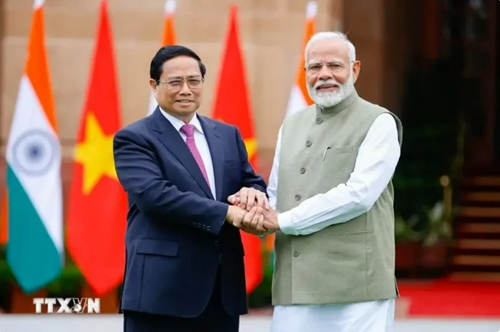Along with issuing a joint statement on strengthening bilateral comprehensive strategic partnership and signing nine cooperation agreements in the fields of diplomacy, defense, finance, health care, culture, tourism, human resources training, and especially an action program to implement the bilateral comprehensive strategic partnership in the 2024-2028 period, the two sides concurred to bolster their cooperation in five aspects, FM Son said.
    |
 |
|
Prime Minister Pham Minh Chinh (left) and Indian Prime Minister Narendra Modi |
Firstly, Vietnam and India agreed to promote higher strategic and political trust. Leaders of the two countries affirmed the significance of further increasing delegation exchanges and meetings through the Party, parliament, government and locality-to-locality channels.
Vietnam’s announcement of its membership in the Coalition for Disaster Resilient Infrastructure (CDRI) and its affirmation of early completion of procedures to join the International Solar Alliance (ISA), two of India’s key global initiatives, have contributed to strengthening trust between the two countries, Son added.
Secondly, the two sides will further deepen defense-security cooperation by promoting the efficient implementation of the joint statement on the Vietnam-India defense partnership until 2030, expanding collaboration in maritime security, cyber security, and counter-terrorism. The signing of a 500-million-USD credit package for defense is a breakthrough made during the visit, the FM underlined.
Thirdly, Vietnam and India pledged to make bilateral economic, trade and investment more substantive, effective and breakthrough. The two sides aim for 20 billion USD in two-way trade by 2030, while doubling investment value.
Vietnam proposed that India remove trade barriers and open its door for Vietnam's strong products such as electronics, garment-textiles, and agricultural products; while calling for large-scale Indian corporations to invest in Vietnam in the fields of infrastructure, pharmaceuticals and energy.
On this occasion, Vietnamese and Indian businesses signed six major contracts in aviation, airports and logistics. Vietnamese carrier Vietjet Air announced a direct air service from Da Nang to Ahmedabad of India, a step further in increasing the number of direct flights between the two countries from currently 54 flights per week.
Fourthly, the two countries will expand cooperation in science-technology and innovation, Son said. The FM noted that the two sides agreed to promote collaboration in research and development (R&D) and innovation in the fields of core technology, semiconductor chips, artificial intelligence, atomic energy, rare earth, while broadening cooperation in the petrochemical sector and new energy, and promoting the establishment of joint ventures to produce IT products and cooperating in training IT engineers to meet the development needs of this industry.
Fifthly, the two sides will promote closer bilateral partnership in culture, tourism and people-to-people exchange. They agreed to early sign a deal on tourism cooperation, and shake hands in preserving and restoring Cham towers in My Son Sanctuary in Quang Nam province and diversifying forms of people-to-people exchanges, Son added.
Noting that PM Chinh is one of the first foreign leaders invited by Indian PM Narendra Modi after his re-election for the third term, Son held that the visit is of great significance, creating momentum for bilateral ties and opening up a new chapter of substantive, extensive and deep relationship between Vietnam and India with more opportunities.
The two sides affirmed their close friendship and traditional friendship as well as the respect and support for each other in the overall foreign policy. Indian leaders expressed their deep condolences over the passing of General Secretary Nguyen Phu Trong, an outstanding leader of Vietnamese people and a close friend of the Indian people.
During the visit, Vietnamese and Indian leaders reiterated the message of further strengthening the Vietnam-India comprehensive strategic partnership in traditional areas such as defense - security, trade-nvestment, and culture-education, and expanding to new areas of green economy, digital economy, knowledge-based economy.
Vietnam and India also affirmed their mutual support and the will to join hands in building peace, stability, cooperation and development in the Asia-Pacific and Indian Ocean regions, Son stated.
Source: VNA